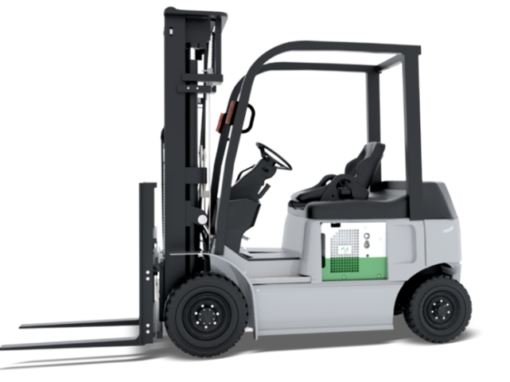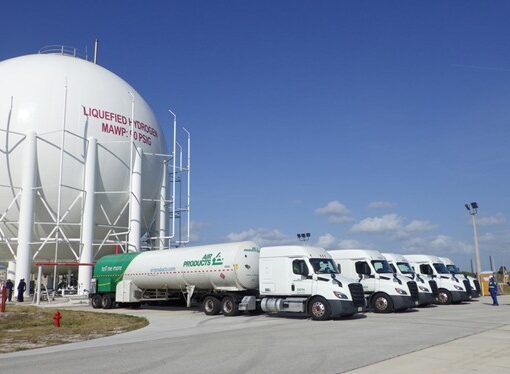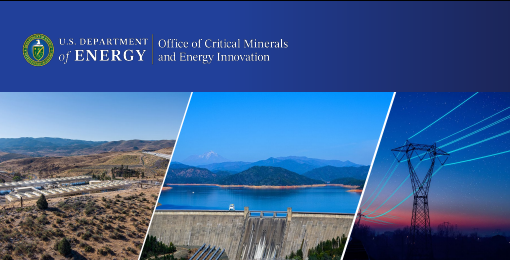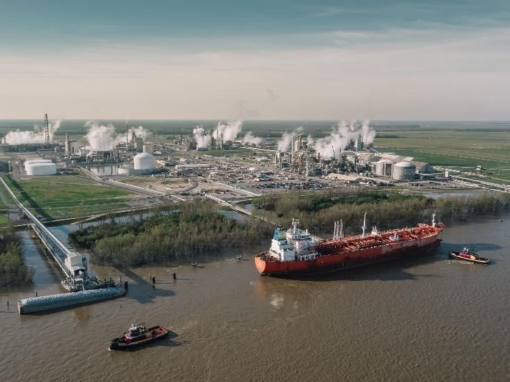September 30, 2025
As the trucking industry increasingly seeks sustainable, yet efficient solutions, hydrogen, used in fuel cells or internal combustion engines, is being recognized as a viable option. Fuel cell trucks produce zero tailpipe emissions while providing comparable range and refueling times to traditional diesel vehicles. Fuel cell vehicles also have the same high torque provided by electric vehicles without the lengthy downtime needed for charging.
In this blog post, we’ll explore the latest developments from FCHEA member companies in heavy-duty hydrogen trucking.
Automakers Leading the Charge
Many of the world’s leading automakers are leading the charge into hydrogen mobility, including heavy-duty trucking. One of those leading forces in this charge is the Korean automaker Hyundai. The Hyundai XCIENT Fuel Cell is the world’s first mass-produced hydrogen-powered heavy-duty truck, and has been deployed in 13 countries, accumulating over 13 million kilometers since its launch in 2020.
More recently, Hyundai is involved in the NorCAL ZERO Project in Northern California, deploying 30 of its Class 8 XCIENT Fuel Cell trucks to operate between the San Francisco Bay Area and Central Valley. This initiative is supported by a public–private consortium that includes Hyundai, FirstElement Fuel, and the Port of Oakland, as well as regulatory agencies and community groups.
Hyundai also recently deployed a Hyundai XCIENT heavy-duty hydrogen fuel-cell electric truck to support its clean logistics operations in Ellabell, Georgia. The truck will transport vehicle parts from Hyundai Motor Group Metaplant America suppliers across the region to its megasite daily. Hyundai plans to eventually deploy 21 of its XCIENT trucks to support this operation.
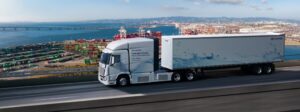
(Source: Hyundai)
Hyundai is not alone in its effort to deploy heavy-duty hydrogen fuel cell trucks. In May of 2024, Honda announced a concept Class 8 hydrogen fuel cell electric truck. Serial production of the 240-kW systems is underway at Fuel Cell System Manufacturing, Honda’s joint manufacturing venture with General Motors in Brownstown, Michigan.
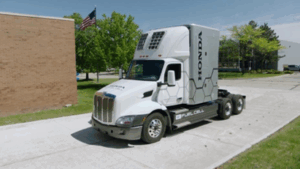
(Source: Honda)
Another major leader in hydrogen trucking has been Toyota. This year, Toyota announced it will be expanding its hydrogen fuel cell electric Class 8 heavy-duty trucks in its logistics operations in California. This move is part of Toyota’s broader hydrogen strategy, including building a dedicated hydrogen fueling station and partnering with Air Liquide and Iwatani to support infrastructure and fuel supply. This builds on the work Toyota has already undertaken to operate fuel cell trucks at the Port of Long Beach and Los Angeles.
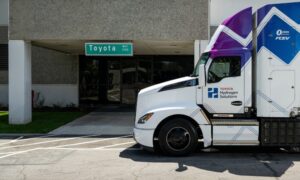
(Source: Toyota)
The Asian automakers are not alone in pursuing hydrogen mobility. Earlier this year, BMW Group announced the launch of the European H2Haul project, funded by the EU’s Clean Hydrogen Partnership. BMW Group has acquired two zero-emission fuel cell trucks that will run between Leipzig, Landsberg, and Nuremberg, Germany, and is working with Iveco, DHL and TEAL Mobility on the project. More recently, DHL Freight and the BMW Group put two trucks into real world operation in Germany.
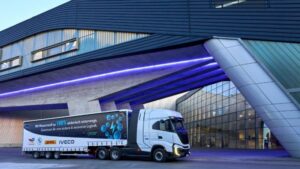
(Source: BMW)
Another major American player in hydrogen trucking is Cummins through their clean energy brand Accelera. In partnership with the U.S. Naval Research Lab, the U.S. Army Combat Capabilities Development Command, the U.S. Army Corps of Engineers, the U.S. Department of Energy, and the U.S. Department of Homeland Security, Accelera has developed the H2Rescue, an emergency vehicle powered by an Accelera fuel cell engine that is designed to offer critical relief in a time of emergency and natural disasters. On October 25, 2024, H2Rescue successfully completed a 1,806-mile journey on a single hydrogen fill, setting a record in a brand-new category.
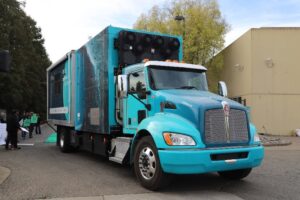
(Source: Accelera)
Fuel cells are not the only pathway into hydrogen trucking. Other companies are exploring internal combustion engines as well. Southwest Research Institute (SwRI) launched the Hydrogen Internal Combustion Engine 2 (H2-ICE2) Consortium to help the automotive and transportation industries understand and address technical challenges in developing hydrogen vehicles. Over an 18-month development period, SwRI converted a Cummins X15N natural‑gas engine to run on hydrogen and integrated 350 bar compressed hydrogen storage tanks from FORVIA. Cummins supplied SWRI with an X15N natural gas engine from the new Cummins HELM fuel agnostic platform. SWRI then converted the engine to run on hydrogen.
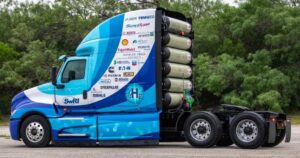
(Source: SwRI)
With ongoing innovation in fuel cell technology, infrastructure development, and increasing commercial deployments, hydrogen-powered heavy-duty trucks are proving to be a viable and powerful solution for decarbonizing the transportation sector and meeting critical performance goals.
